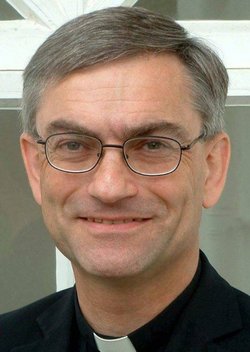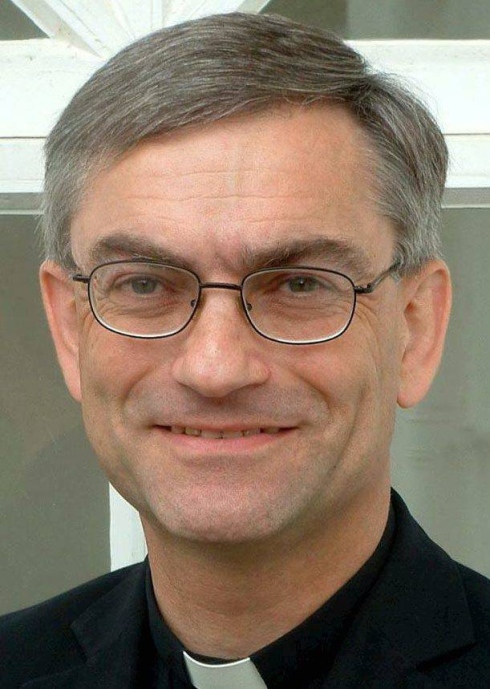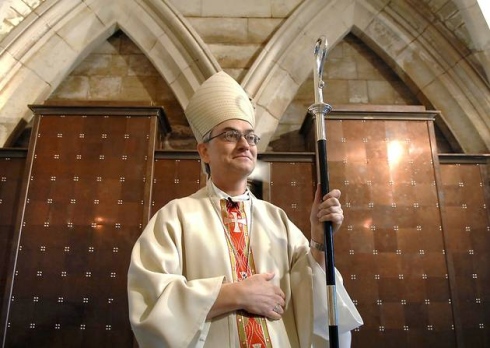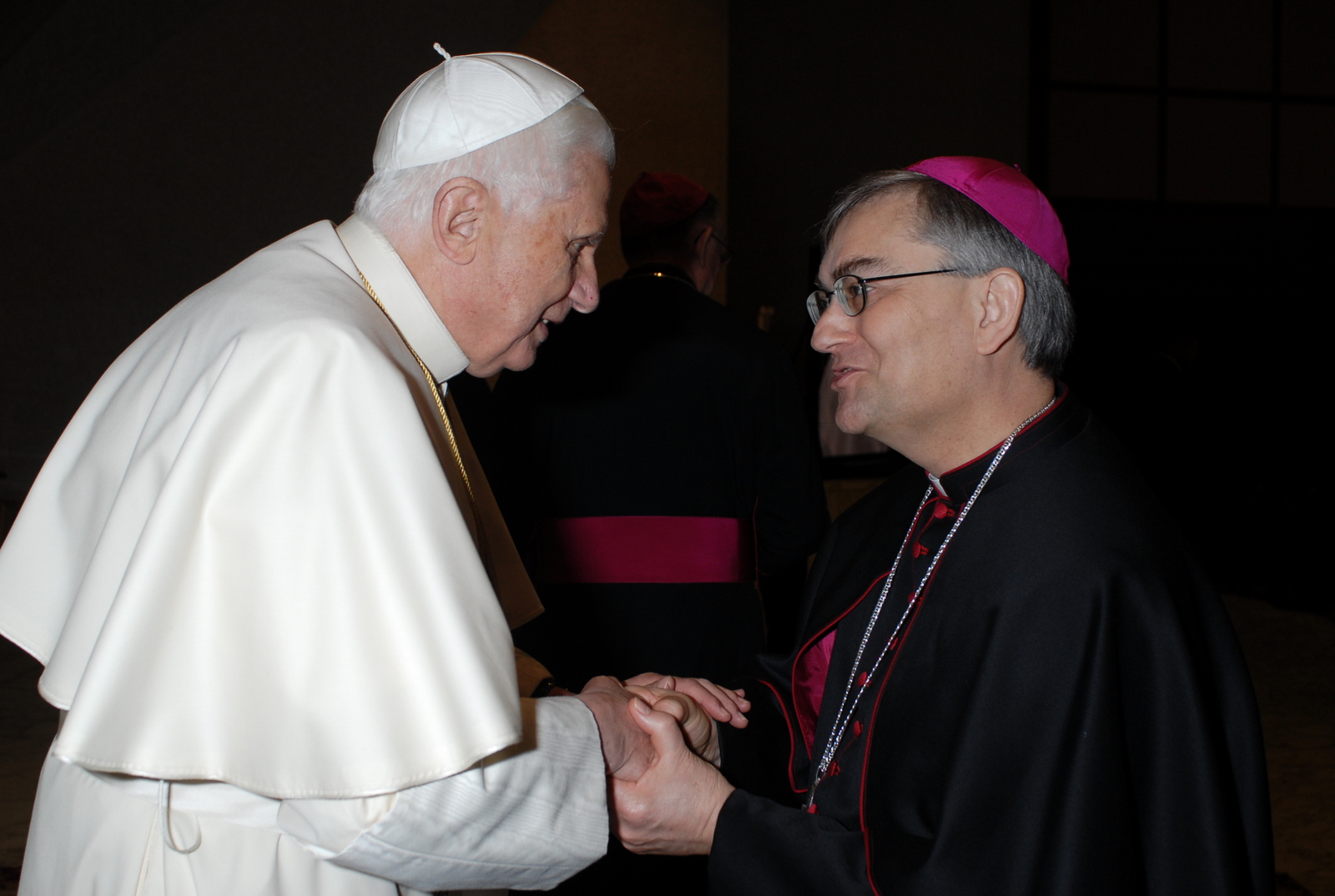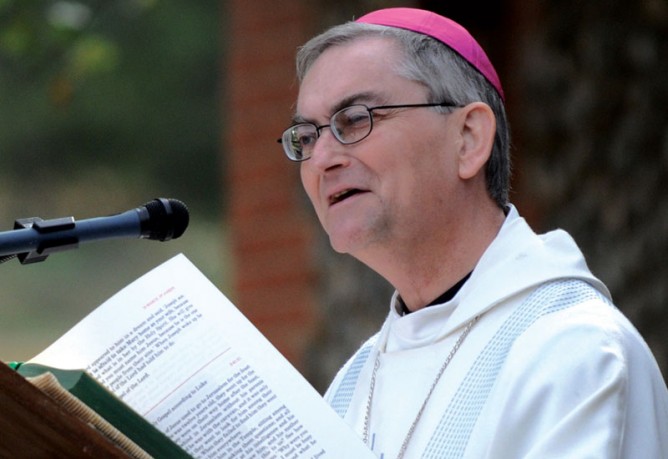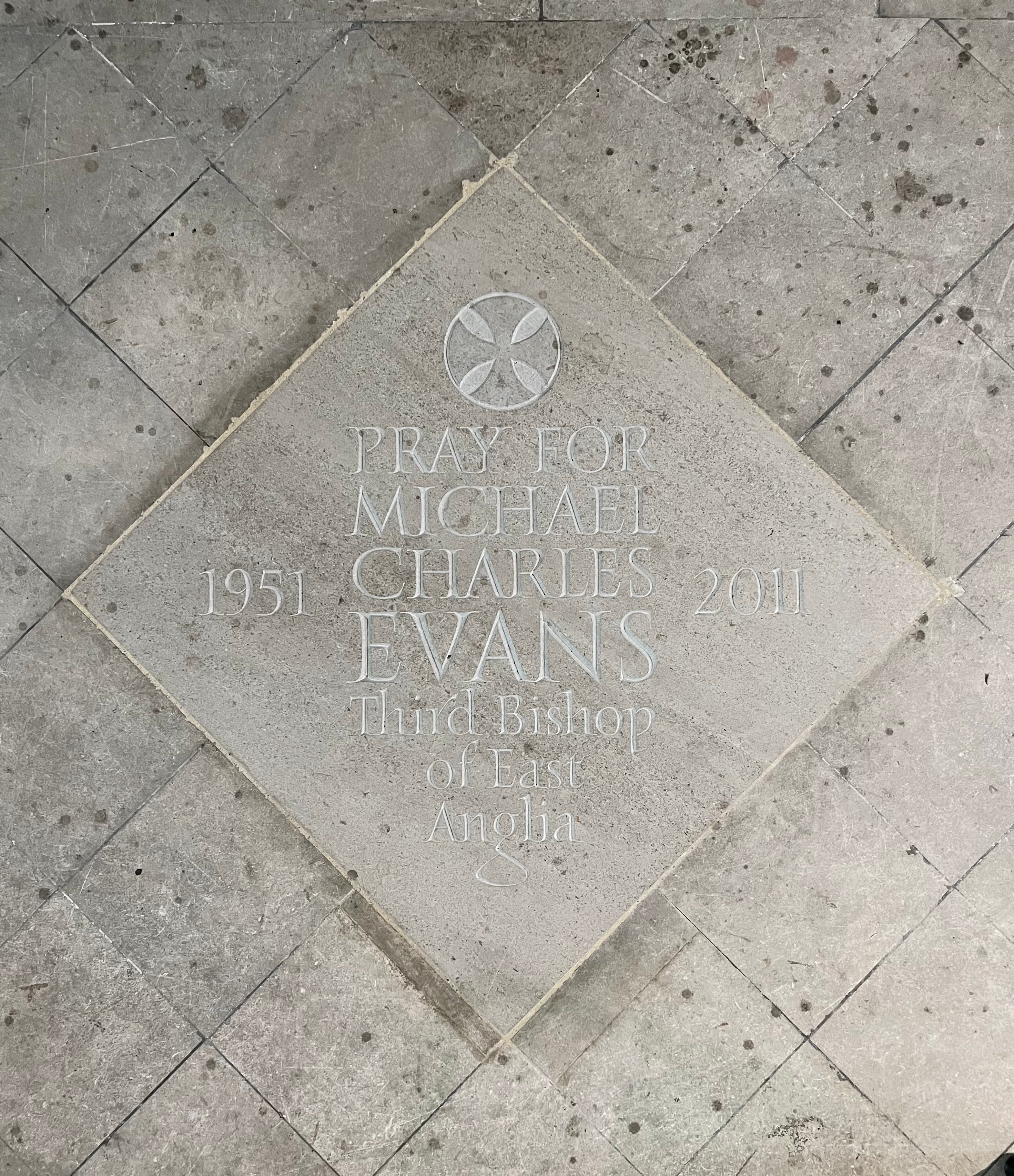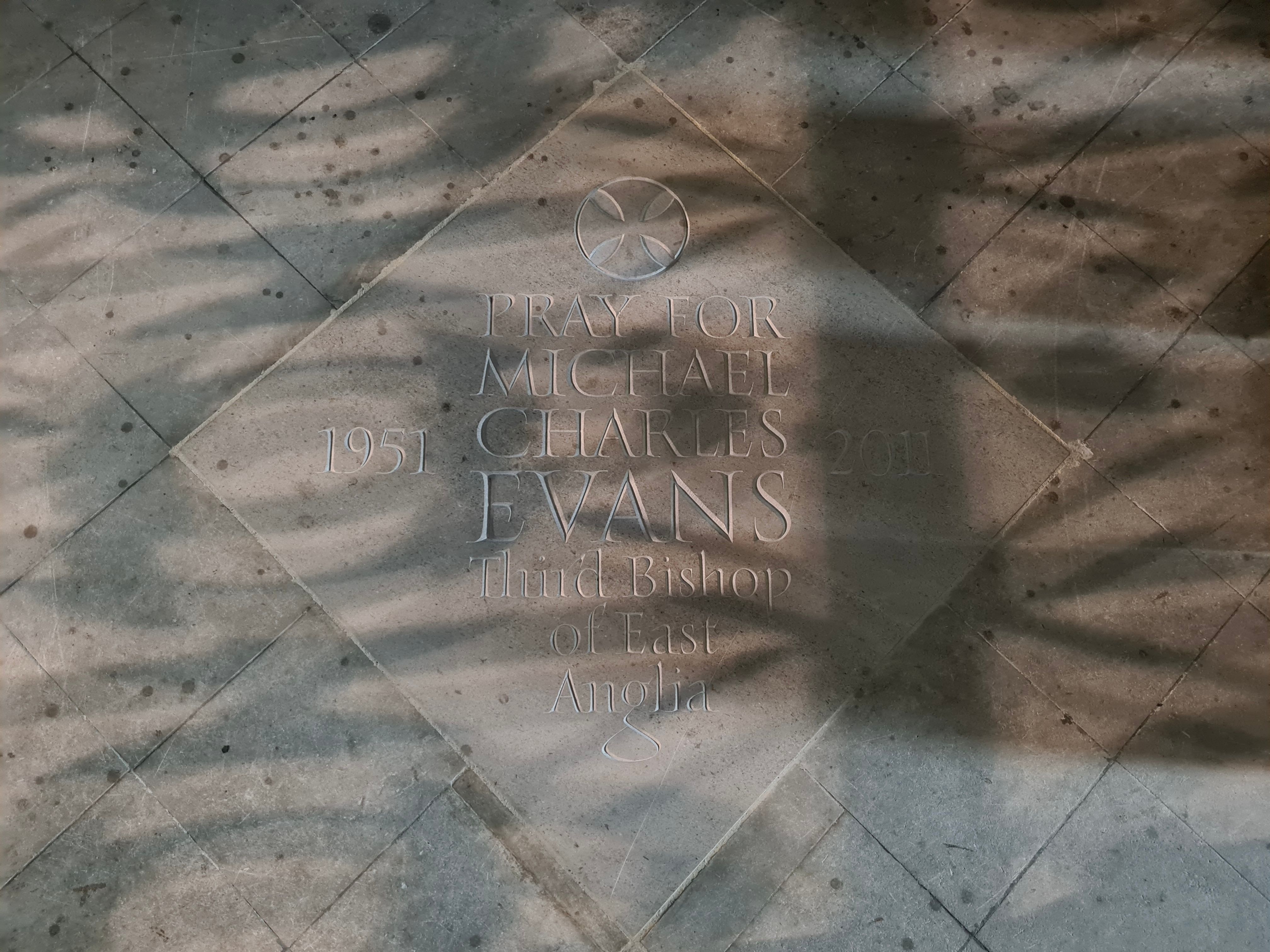Ordained for the Archdiocese of Southwark on June 22, 1975, he spent two years as assistant priest at St. Elizabeth's in Richmond, Surrey. From 1977 till 1979, he studied for a master of theology degree at Heythrop College, University of London, and then returned to St. John's Seminary for eight years as lecturer in Christian Doctrine. While there, he was also chaplain to St. Teresa's Convent School in Effingham, Surrey. From 1985 until 1987, he served as vice-rector at the Seminary, with the then Monsignor Peter Smith, later the Second Bishop of East Anglia, and Archbishop of Southwark, as rector.
From 1987 till 1993, he was a university chaplain at the South London Universities Chaplaincy, returning to the Seminary from 1993 until 1995, once again as lecturer and vice-rector. He was one of the two assisting priests at Mgr. Peter Smith's consecration as Bishop of East Anglia in May 1995.
From 1995, Canon Michael Evans was parish priest of St Augustine's in Tunbridge Wells, Kent, a thriving parish with a Sunday Mass attendance of 1300 and with many young people actively involved in its life and worship.
He was appointed canon theologian of the Archdiocese of Southwark by Archbishop Michael Bowen in 1996, and had many other responsibilities. He has been a regular writer of articles and pamphlets on theological issues.
At 51 years of age, Canon Michael Evans was appointed as the Third Bishop of the Diocese of East Anglia by Pope John Paul II. He received his episcopal consecration at St. John's Cathedral in Norwich on March 19, 2003, from Cardinal Cormac Murphy O'Connor, assisted by Archbishops Michael George Bowen and Peter David Smith, in a ceremony marked by a great involvement of young people and Taizé chant. This was to set the tone for a ministry that had a strong focus on young people, and on bringing them into the heart of the life and mission of the Church. His regular meetings with the Diocesan Youth Council which he established continued until shortly before his death, and his home at Poringland saw regular Youth retreats, Masses and candlelight vigils, as well as pizza, bonfires, fireworks and his trademark chilli-con-carne in various guises. He led two of the largest diocesan groups of young people from this country to join with millions of young people from all over the globe at the Pope's World Youth Day celebrations, as well as establishing an annual youth pilgrimage from East Anglia to Taize.
A great supporter of Catholic education and immensely proud of the excellent schools within the diocese, he visited all the schools within the first year as bishop, and in subsequent years was a regular visitor, finding joy and bringing joy to staff and young people alike. Whether it was a year group assembly, or a big event he was a friendly, inspiring and enthusiastic participant. Despite his serious decline in health he was still looking forward to attending year end celebrations at St. Louis Middle School in Bury and St. Louis Primary School in Newmarket later this month.
Bishop Michael's enduring and deep commitment to the gospel of justice and peace was reflected in his own personal way of life which was marked by simplicity and integrity. He dealt with problems compassionately, methodically, pastorally and justly. He drew inspiration from his Catholic faith and the teaching of the Church, in particular Pope Paul VI and his great encyclical Populorum Progressio. The martyred Archbishop Oscar Romero of El Salvador was also a great hero in his championing of the rights of the poor and disenfranchised and Bishop Michael was a founder member of the Romero Trust. He was privileged to celebrate Mass at the altar where Romero was killed, and has taken an active interest in the proposed establishment of a shrine in his honour at Southwark Cathedral.
A committed ecumenist, Bishop Michael, was a member of the British Catholic-Methodist Committee from 1991, appointed as a member of the International Joint Commission for Dialogue between the Roman Catholic Church and the World Methodist Council in 1996, and following his ordination as bishop was appointed chairman of the Bishops' Conference Committee for Dialogue and Christian Unity. His knowledge, commitment and contribution to dialogue with the Methodist communion was immense. As Chairman of the Committee responsible for dialogue with other faiths, he was appointed co-president of the Christian-Muslim Forum on which he served alongside the Archbishop of Canterbury, Rowan Williams. At a local level, his relationships with leaders of other Churches and faiths were always marked by warmth and genuine friendship.
Bishop Michael was also a renowned life-long supporter of Leeds United Football Club.
A diagnosis of advanced and aggressive prostate cancer early in his time in East Anglia could have brought about a lessening of energy in another person, but right from the beginning, whilst accepting that he was dying, Bishop Michael was determined to carry on living and working. His diary commitments during the last six years tended to increase rather than diminish as he drove himself to engagements all around the counties of Norfolk, Suffolk, Cambridgeshire, and the Unitary Authority of Peterborough which comprise the Catholic Diocese of East Anglia. Indeed most of his achievements in reinvigorating the Catholic community, reaching out to the young, nurturing vocations and preparing a growing Catholic community for a future with fewer priests took place during the period of his illness. Only following a stroke last September did he slow down, but still continued to travel widely around the Diocese until at the beginning of 2011, he announced that his consultants had given him 'weeks rather than months' to live. Even then, he was determined to 'live with dying' rather than give up, and has continued to exercise pastoral care of the Diocese as well as fulfilling engagements that were possible given his condition. On Pentecost Sunday he confirmed 46 young people at St. John's Cathedral in Norwich, followed by more adult confirmations at the National Shrine of Our Lady at Walsingham. In the weeks immediately before his death, he celebrated first holy communion and confirmation for young people in the parish church at Poringland which was next to his home, and had been looking forward to preach at the ordination of one of his students, Fr. Padraig Hawkins on Saturday, July 9.
Evans was admitted to the Norfolk & Norwich University Hospital on Thursday, July 7, after collapsing at his home. He never regained consciousness, but died peacefully surrounded by some of his friends and under the excellent care of the staff of the hospital, aged 59.
Bishop Michael's body was received into his cathedral in Norwich on Tuesday July 19, at 5.30 pm., in readiness for his funeral Mass, which was celebrated on Wednesday, July 20, at 1.30 pm. Presided by Archbishop Vincent Nicholls, the ceremony saw the attendance of around 30 bishops, 120 priests, 20 deacons, and Bishop Evans's 96 year old mother, Jeanette. In accordance with the bishop's wishes, cremation followed at the Earlham Road Crematorium, Norwich. His ashes were later buried at the said cathedral of Norwich in front of an icon of Felix, a 7th century bishop who was credited with bringing Christianity to East Anglia and who was made a diocesan patron saint by Bishop Michael.
Ordained for the Archdiocese of Southwark on June 22, 1975, he spent two years as assistant priest at St. Elizabeth's in Richmond, Surrey. From 1977 till 1979, he studied for a master of theology degree at Heythrop College, University of London, and then returned to St. John's Seminary for eight years as lecturer in Christian Doctrine. While there, he was also chaplain to St. Teresa's Convent School in Effingham, Surrey. From 1985 until 1987, he served as vice-rector at the Seminary, with the then Monsignor Peter Smith, later the Second Bishop of East Anglia, and Archbishop of Southwark, as rector.
From 1987 till 1993, he was a university chaplain at the South London Universities Chaplaincy, returning to the Seminary from 1993 until 1995, once again as lecturer and vice-rector. He was one of the two assisting priests at Mgr. Peter Smith's consecration as Bishop of East Anglia in May 1995.
From 1995, Canon Michael Evans was parish priest of St Augustine's in Tunbridge Wells, Kent, a thriving parish with a Sunday Mass attendance of 1300 and with many young people actively involved in its life and worship.
He was appointed canon theologian of the Archdiocese of Southwark by Archbishop Michael Bowen in 1996, and had many other responsibilities. He has been a regular writer of articles and pamphlets on theological issues.
At 51 years of age, Canon Michael Evans was appointed as the Third Bishop of the Diocese of East Anglia by Pope John Paul II. He received his episcopal consecration at St. John's Cathedral in Norwich on March 19, 2003, from Cardinal Cormac Murphy O'Connor, assisted by Archbishops Michael George Bowen and Peter David Smith, in a ceremony marked by a great involvement of young people and Taizé chant. This was to set the tone for a ministry that had a strong focus on young people, and on bringing them into the heart of the life and mission of the Church. His regular meetings with the Diocesan Youth Council which he established continued until shortly before his death, and his home at Poringland saw regular Youth retreats, Masses and candlelight vigils, as well as pizza, bonfires, fireworks and his trademark chilli-con-carne in various guises. He led two of the largest diocesan groups of young people from this country to join with millions of young people from all over the globe at the Pope's World Youth Day celebrations, as well as establishing an annual youth pilgrimage from East Anglia to Taize.
A great supporter of Catholic education and immensely proud of the excellent schools within the diocese, he visited all the schools within the first year as bishop, and in subsequent years was a regular visitor, finding joy and bringing joy to staff and young people alike. Whether it was a year group assembly, or a big event he was a friendly, inspiring and enthusiastic participant. Despite his serious decline in health he was still looking forward to attending year end celebrations at St. Louis Middle School in Bury and St. Louis Primary School in Newmarket later this month.
Bishop Michael's enduring and deep commitment to the gospel of justice and peace was reflected in his own personal way of life which was marked by simplicity and integrity. He dealt with problems compassionately, methodically, pastorally and justly. He drew inspiration from his Catholic faith and the teaching of the Church, in particular Pope Paul VI and his great encyclical Populorum Progressio. The martyred Archbishop Oscar Romero of El Salvador was also a great hero in his championing of the rights of the poor and disenfranchised and Bishop Michael was a founder member of the Romero Trust. He was privileged to celebrate Mass at the altar where Romero was killed, and has taken an active interest in the proposed establishment of a shrine in his honour at Southwark Cathedral.
A committed ecumenist, Bishop Michael, was a member of the British Catholic-Methodist Committee from 1991, appointed as a member of the International Joint Commission for Dialogue between the Roman Catholic Church and the World Methodist Council in 1996, and following his ordination as bishop was appointed chairman of the Bishops' Conference Committee for Dialogue and Christian Unity. His knowledge, commitment and contribution to dialogue with the Methodist communion was immense. As Chairman of the Committee responsible for dialogue with other faiths, he was appointed co-president of the Christian-Muslim Forum on which he served alongside the Archbishop of Canterbury, Rowan Williams. At a local level, his relationships with leaders of other Churches and faiths were always marked by warmth and genuine friendship.
Bishop Michael was also a renowned life-long supporter of Leeds United Football Club.
A diagnosis of advanced and aggressive prostate cancer early in his time in East Anglia could have brought about a lessening of energy in another person, but right from the beginning, whilst accepting that he was dying, Bishop Michael was determined to carry on living and working. His diary commitments during the last six years tended to increase rather than diminish as he drove himself to engagements all around the counties of Norfolk, Suffolk, Cambridgeshire, and the Unitary Authority of Peterborough which comprise the Catholic Diocese of East Anglia. Indeed most of his achievements in reinvigorating the Catholic community, reaching out to the young, nurturing vocations and preparing a growing Catholic community for a future with fewer priests took place during the period of his illness. Only following a stroke last September did he slow down, but still continued to travel widely around the Diocese until at the beginning of 2011, he announced that his consultants had given him 'weeks rather than months' to live. Even then, he was determined to 'live with dying' rather than give up, and has continued to exercise pastoral care of the Diocese as well as fulfilling engagements that were possible given his condition. On Pentecost Sunday he confirmed 46 young people at St. John's Cathedral in Norwich, followed by more adult confirmations at the National Shrine of Our Lady at Walsingham. In the weeks immediately before his death, he celebrated first holy communion and confirmation for young people in the parish church at Poringland which was next to his home, and had been looking forward to preach at the ordination of one of his students, Fr. Padraig Hawkins on Saturday, July 9.
Evans was admitted to the Norfolk & Norwich University Hospital on Thursday, July 7, after collapsing at his home. He never regained consciousness, but died peacefully surrounded by some of his friends and under the excellent care of the staff of the hospital, aged 59.
Bishop Michael's body was received into his cathedral in Norwich on Tuesday July 19, at 5.30 pm., in readiness for his funeral Mass, which was celebrated on Wednesday, July 20, at 1.30 pm. Presided by Archbishop Vincent Nicholls, the ceremony saw the attendance of around 30 bishops, 120 priests, 20 deacons, and Bishop Evans's 96 year old mother, Jeanette. In accordance with the bishop's wishes, cremation followed at the Earlham Road Crematorium, Norwich. His ashes were later buried at the said cathedral of Norwich in front of an icon of Felix, a 7th century bishop who was credited with bringing Christianity to East Anglia and who was made a diocesan patron saint by Bishop Michael.
Inscription
PRAY FOR
MICHAEL
CHARLES
EVANS
Third Bishop
of East
Anglia
1951 - 2011
Sponsored by Ancestry
Advertisement
Records on Ancestry
Sponsored by Ancestry
Advertisement
